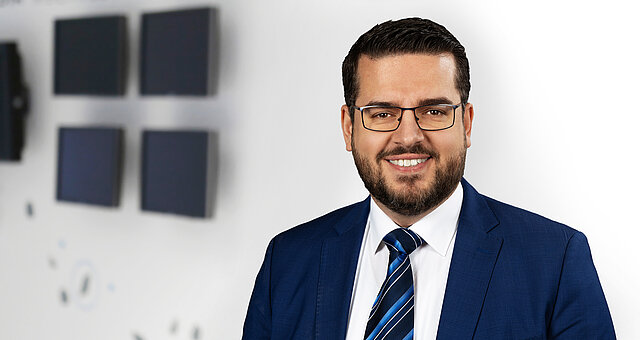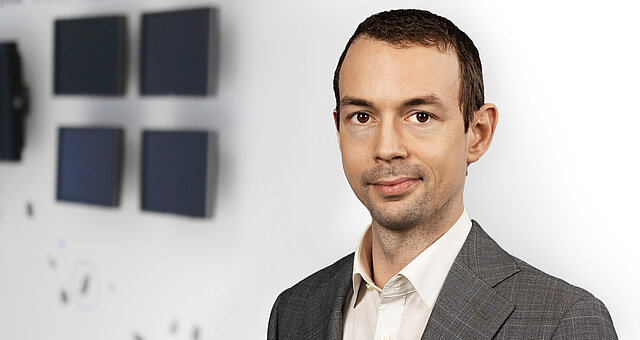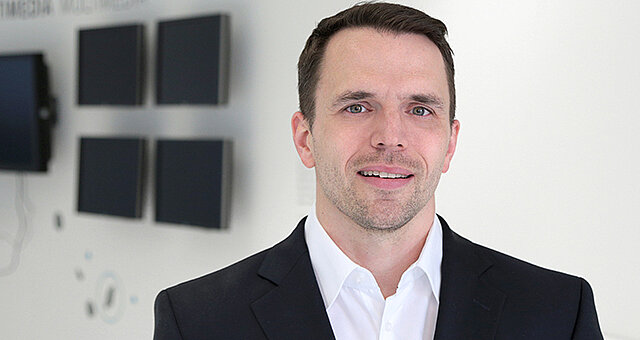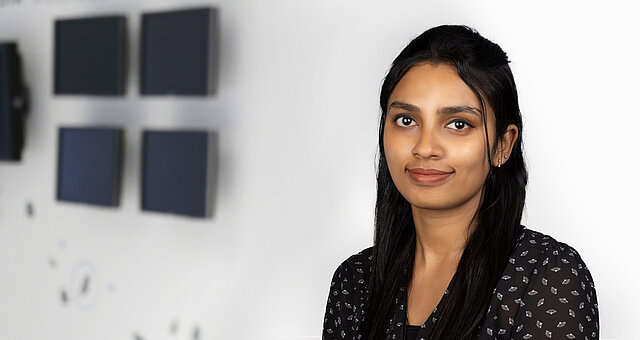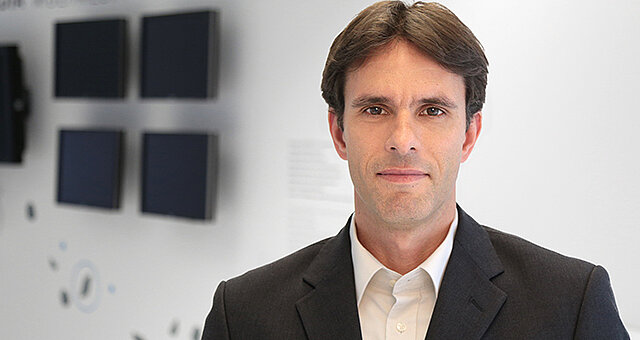OFC 2025
APR 2025
01 - 03
San Francisco, USA

The Fraunhofer Heinrich-Hertz-Institut (HHI) is a world leader in the development for mobile and optical communication networks and systems as well as processing and coding of video signals. Together with international partners from research and industry, Fraunhofer HHI works in the whole spectrum of digital infrastructure – from fundamental research to the development of prototypes and solutions.
At OFC 2025 Fraunhofer HHI presents the latest developments in Photonic Components, Networks and Systems at Fraunhofer Booth 5445 from April 01-03 in San Francisco, USA.
Integrated Photon Pair Source
Compact modules for the generation of photon pairs
Photon sources are crucial for quantum communications, sensing, and computing. Fraunhofer HHI leverages the micro-optical bench technology of its PolyBoard platform to integrate bulk non-linear crystals (ppKTP, ppLN, etc.) with photonics on-chip. This innovation enables compact, optically pumped photon pair sources via spontaneous parametric downconversion. The modules are fiber-coupled and temperature-controlled for user convenience
QKD Transmitter Modules
Photonic Integrated Circuits for CV- and DV-QKD
Fraunhofer HHI develops modules for quantum communications with continuous and discrete variables by leveraging the capabilities of photonic integration. The modules can be tailored towards customer specifications to enable various protocols and allow for seamless integration with existing infrastructure.
SiN-InP Laser Modules
Mode-Locked and External-Cavity Lasers
Fraunhofer HHI’s SiN wafer line enables for the hybrid integration of SiN PICs with active InP components for mode-locked lasers with a tailored repetition rate and external cavity tunable lasers operating at NIR wavelengths.
Tunable Laser Chip
Widley tunable laser with low linewidth
Fraunhofer HHI has developed widely tunable lasers which are compatible with monolithic PIC integration. Currently, the devices are available on dedicated wafer runs. MPW building blocks will be available from MPW#40.
Upcoming MPW runs:
MPW#39: 01.08.2025
MPW#40: 01.11.2025
Directly Modulated Laser chip
High-Speed Directly Modulated Laser
Fraunhofer HHI has offers high-speed directly modulated lasers (DMLs) for both cooled and uncooled operations in O- and C-band.
- DFB based DMLs (left): Operate at 28 Gbps NRZ for uncooled operation, featuring a low threshold current (<6 mA), high output power (>30 mW) and modulation bandwidth of 27 GHz at 20 °C.
- Dual DFB based DMLs (right): Utilizes photon-photon resonance (PPR), these DMLs achieve 72 Gbps NRZ for cooled operation and 40 Gbps NRZ for uncooled operation. They feature a threshold current <10 mA, output power >15 mW and modulation bandwidth >57 GHz at 20°C. Additionally, high-speed DML arrays are available.
Single Photon Avalanche Photodiode Module
Single Photon Detection for Quantum Communication and Sensing
Fraunhofer HHI provides photodetector modules for single photon detection operating from the O- to the L-band. The SPAD chips inside the modules are based on mature InP technology and are fabricated in the wafer process line of Fraunhofer HHI, with Telcordia and space-qualified processes. The SPAD supply chain is completely within EU, including packaging at the Fraunhofer HHI facility.
Innovative Optical Reference Transmitter and Receiver for High-Speed Data Transmission
Fraunhofer HHI presents advanced optical reference transmitter and receiver at OFC, developed for next-generation high-speed data transmission in new wavelength bands:
• O-band Multi-Format Transmitter: Converts electrical datasignals into I/Q-modulated optical signals in the O-band (1260-1360 nm) enabling flexible and high-performance reference transmitters in new wavelength bands.
• 70 GHz Coherent O-band Receiver: A coherent receiver frontend for the O-band (1260-1360 nm) with polarization and phase diversity, allowing the set-up of high-bandwidth reference receivers with subsequent precise signal processing for demanding applications.
Solutions are also available in other wavelength bands from O- to U-band. In addition, Fraunhofer HHI collaborates with ID Photonics to develop highly integrated optical test and measurement equipment, specifically tailored to the needs of modern telecommunications and datacom applications:
• Coherent Optical Reference Receiver: A receiver with up to 60 GHz bandwidth, ideal for terabit/s data transmission and sophisticated signal processing.
• DP-IQ Reference Transmitter: A transmitter with up to 80 GHz bandwidth that converts electrical data signals into various optical modulation formats with stable bias control, perfect for R&D of cutting-edge telecommunications and datacom systems.
These solutions offer outstanding flexibility and performance for the digital future of optical networks.
High-Speed Digital-to-Analog Converter
Utilizing cascaded analog multiplexing
This prototype of a high-speed Digital-to-Analog Converter (DAC) utilizes our cascaded analog multiplexing (AMUX) technology and an FPGA driver to provide a cost-efficient solution for broadband signal generation with possible real-time capability.
Read more about High-Speed Cascaded Analog Multiplexing DAC and Ultra-Broadband Signal Generation.
Modular Multi Source Power Supply for High-Precision Research
Flexible and Efficient Lab Power Management
Fraunhofer HHI introduces the Modular Multi Source power supply, designed to streamline lab setups by consolidating multiple power sources into a single, compact unit. With up to 12 channels per slot across 8 slots, it offers customizable current and voltage outputs, laser drivers, and TEC controllers. This modular system enhances precision and reduces clutter, making it ideal for various research fields, including electronics, photonics, and semiconductor development. Ethernet connectivity and a small form factor ensure versatile, efficient lab operations.
Quantum Key Distribution system for future-proof security
Quantum Key Distribution (QKD) enables future-proof long-term protection of sensitive data and communication applications – even against the imminent security threats of quantum computers. Fraunhofer HHI developed a high-speed QKD system that seamlessly integrates in telecom network infrastructures.
Time to Digital Converter with Sub-nanosecond Resolution (TDC)
A versatile measurement device for digitizing events in time domain with a resolution down to 0.1 nanoseconds
Fraunhofer HHI’s Timetagger is a versatile measurement device with multiple input channels allowing digitizing the time of events with a resolution of 100 ps. Switching threshold and hysteresis could be set for any input channel. The digitized events could be read by a network interface.
Single Photon Detection Module
Fraunhofer HHI's Single Photon Detection Module offers an efficient, compact, and cost-effective solution for precise single photon detection in the optical C-band and O-band. Ideal for quantum communication, it features state-of-the-art detection efficiency and low dark count rates.
Network Observability Platform (NOBS)
Data Sovereign and LLM-assisted Features for E2E Network Monitoring
This software prototype enables comprehensive monitoring of multi-vendor multi-domain packet optical network infrastructure and offers various data usage restrictions policies to enable cross-stakeholder telemetry data sharing while adhering to data confidentiality and NDA compliance regulations. The following new features will be showcased in our booth:
- LLM-assisted Network Copilot with NDA Compliance: This feature enables intuitive interaction with NETCONF/OpenConfig-enabled devices using simple human written prompts. This feature allows junior network admins deliver what can only be achieved by a highly skilled network admin for API client code generation and protocol specific response analysis and comprehension.
- Cross-stakeholder Data Sharing Policies: This feature offers various data usage restrictions policies for network data sharing, including anonymisation, time-based, location-based, and stakeholder-specific , based on International Data Spaces Association (IDSA) principles.
We showcase these features of NOBS through a set of demos carried out on an SDN-enabled packet optical networking testbed.
LiFi 2.0
Next Generation Laser-Based Optical Wireless Communication
Fraunhofer HHI engages in the development of the next generation of optical wireless communication systems. LiFi 2.0 combines high-power wide-beam laser transmitters with array receivers to reach wide field-of-view and electronic tracking for up to 4 mobile devices at high data rates up to 10 Gbit/s.
Conference presentations with participation of Fraunhofer HHI
Workshop: "Why LiFi might be better than Wi-Fi?"
Volker Jungnickel
March 30, 2025, 1:00 p.m., rooms 205-206
"Demonstration of a Programmable Node Prototype for Spatial Lane Switching and Band Switching"
Abdelrahmane Moawad
March 31, 2025, 2:00 p.m., room 303
"Live Demonstration of Modulation Format Identification Using a Photonic Neural Network"
Guillermo von Hünefeld
March 31, 2025, 2:00 p.m., room 303
"Demonstration of End-to-End Cross-Border Service Provisioning and Monitoring Using TeraFlowSDN and Eclipse Dataspace Components Connectors"
Angela Mitrovska
March 31, 2025, 2:00 p.m., room 303
"High-Capacity THz Wireless Transmission Supporting Future 6G Optical Networks"
Colja Schubert
March 31, 2025, 2:00 p.m., room 207
"International Testbed Data Sharing Framework with Data Sovereign Features for Network AI/ML Empowerment"
Yusuke Hirota
March 31, 2025, 2:00 p.m., room 303
"Beyond Optical Layer Monitoring: Exploring the Full Potential of Coherent Optical Processing"
Matheus Sena
March 31, 2025, 4:30 p.m., room 201-202
"Record 4 x 106 Gbps Transmission from a Directly Modulated Laser Array Using Photon-Photon Resonance"
Gayatri Vasudevan Rajeswari
April 1, 2025, 4:30 p.m., room 301
"Experimental Validation of Partitioned MIMO Equalizer with Low-Resolution Interface for Mitigation of Mode-Group Coupling in SDM Transmission over 3-Mode Fiber"
Nicolas Braig-Christophersen
April 1, 2025, 6:00 p.m., rooms 205-206
"A Fast and Accurate EDFA Model for the Optimization of Power-Efficient SDM Subsea Transmission Systems"
Aymeric Arnould
April 2, 2025, 8:45 a.m., room 304
"Multi-Agent Design for LLM-assisted Network Management"
Hussein Zaid
April 2, 2025, 9:00 a.m., room 201-202
"Autonomous Service Provisioning and Self-Healing in Multi-Band Multi-Domain IPoWDM Networks"
Hussein Zaid
April 3, 2025, 8:45 a.m., rooms 213-214
